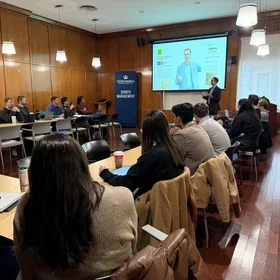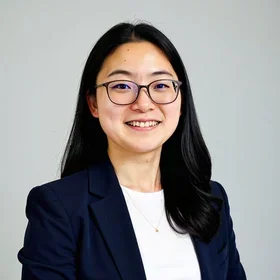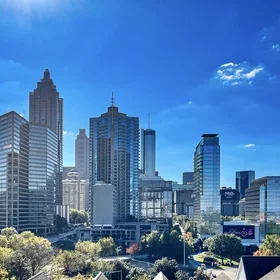By Shana Childs
Sustainability Management M.S. student Brooke Zhang is on a mission to make diversity, equity, and inclusion endemic to climate action. A stint at environmental law firm Earthjustice prior to graduate school “fundamentally changed” the way Zhang thought about sustainability, leaving her determined to advocate for social equity in environmental conservation spaces such as Columbia University’s Sustainability Management program and the SPS community at large.
As a DEIA Associate at the firm, Zhang helped to launch an internal culture program that reinforced the use of inclusive language and moderated company workshops and town halls on DEIA-related topics. “I left that role with a new lens through which I understand everything,” she reflects. “It was a humbling experience that ignited my commitment to keep learning and unlearning around social equity.”
Since enrolling at Columbia, Zhang has dived into DEIA initiatives throughout the University, including contributing to an environmental justice project funded by Columbia Climate School’s DEIA mini-grants and self-nominating for Columbia SPS’s DEIA Committee. Zhang recently spoke about the impact she’s making at Columbia and her vision for the future of DEIA in sustainability.
How do you see DEIA transforming your field?
It’s been an amazing opportunity to operate in a space [Columbia’s Sustainability Management M.S. program] where sustainability is so completely accepted as an urgent matter, and a gift to be surrounded by folks who are also all in to mitigate the impact of climate change right now. Similar to how today’s concept of environmental sustainability is so readily accepted in the Columbia community, I believe that DEIA metrics and benchmarks will one day be accepted as an essential and natural integration into every company’s operations, policies, and internal culture. Sustainability and social equity are two sides of the same coin, and if we want our environmental benchmarks, investments, and wider efforts to support our planet effectively, then we have to address their impacts on our communities.
What motivated you to join SPS’s DEIA Committee?
I entered Columbia wanting to continue my DEIA work through my graduate program in Sustainability Management. In fall 2021, I served as the Director of Strategy for the student organization SUMA Equity Alliance and moderated the Sustainability Management M.S. program’s first DEI Town Hall. I also worked with fellow committee members Jennifer Goez and Domi Enders to help create the Columbia SPS Equity Language Guide.
Before joining the committee, I realized how siloed a large university can be; while there's incredible work across programs and schools, it can sometimes be challenging to engage in consistent collaboration or even find out about existing DEIA initiatives. I realized that being on the SPS DEIA Committee would be an opportunity to foster these collaborations between my program, SPS, and the wider Columbia community.
Is there anything that the committee is doing that you’d like to talk about?
Toward the end of the spring 2022 semester, we hosted the first SPS DEIA Office Hours, where we invited students across programs to discuss DEIA-related issues at Columbia and current world events in a safe space. We’re currently following up on a few action items that came out of this event, such as improving accessibility and finding new ways to integrate DEIA into our programs’ fall/spring orientations.
What’s one thing any person can do to support diversity, equity, inclusion, and accessibility within the SPS community and/or the sustainability movement?
When it comes to systemic change, we often hear that “change starts from within.” I believe that this is hands-down true. It’s essential to be proactive about educating ourselves. There are resources, such as the Columbia SPS Equity Language Guide, that can help us to learn about and support existing environmental justice work through organizations like Native Movement, WEACT, Chicago Asian Americans for Environmental Justice, and Earthjustice. In addition, we should all be intentional about learning from people who are gracious enough to offer their time and emotional labor to help to educate us on these often complex and sensitive topics. From here, initiating brave conversations with friends, family, and coworkers on DEIA-related issues can help spread new understandings and create shared learning.
But there’s one last action underpinning all of this: remembering to be gracious with ourselves. This means taking care of our mental and emotional health and giving ourselves permission to make mistakes because we’re in it for the long game of continuous learning and unlearning around what DEIA means to us and our professional work.


